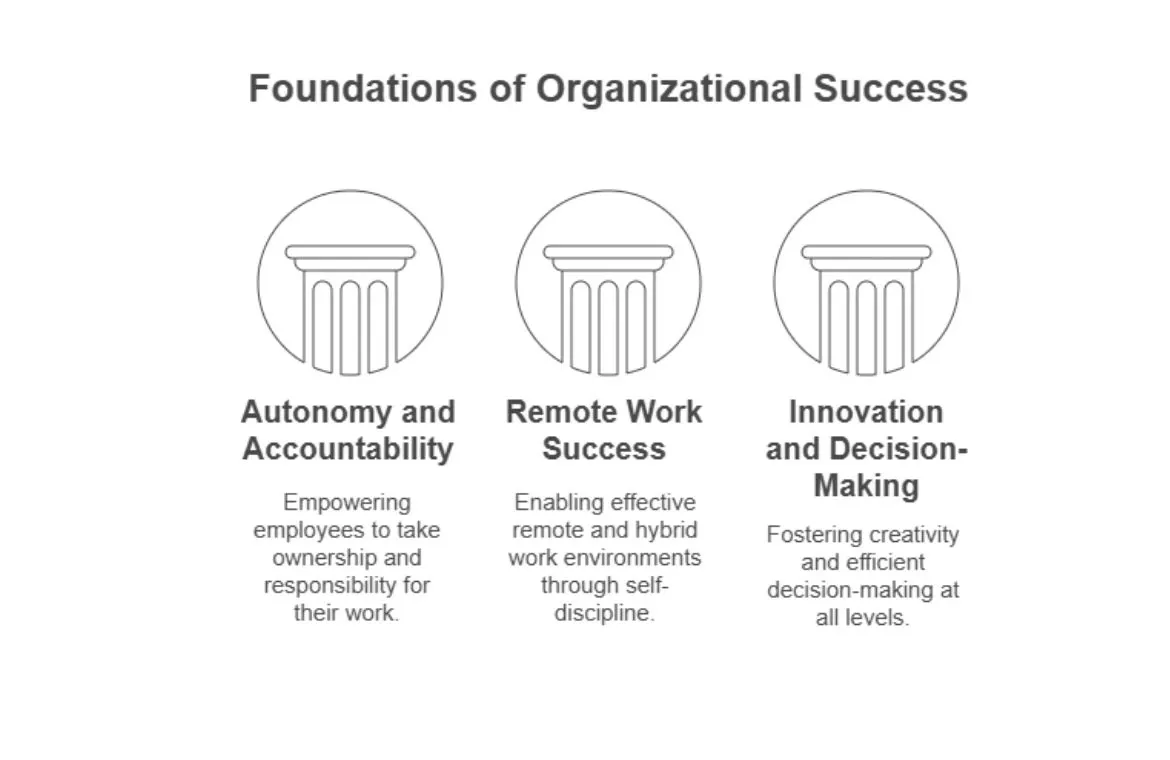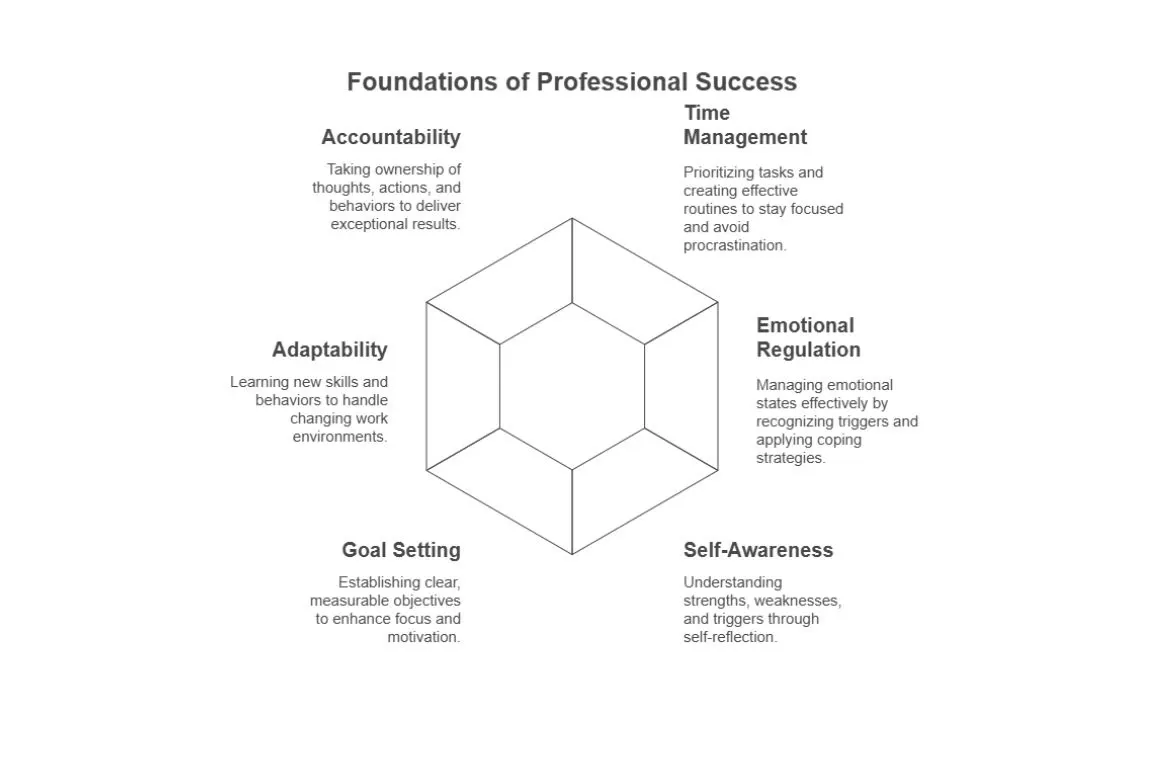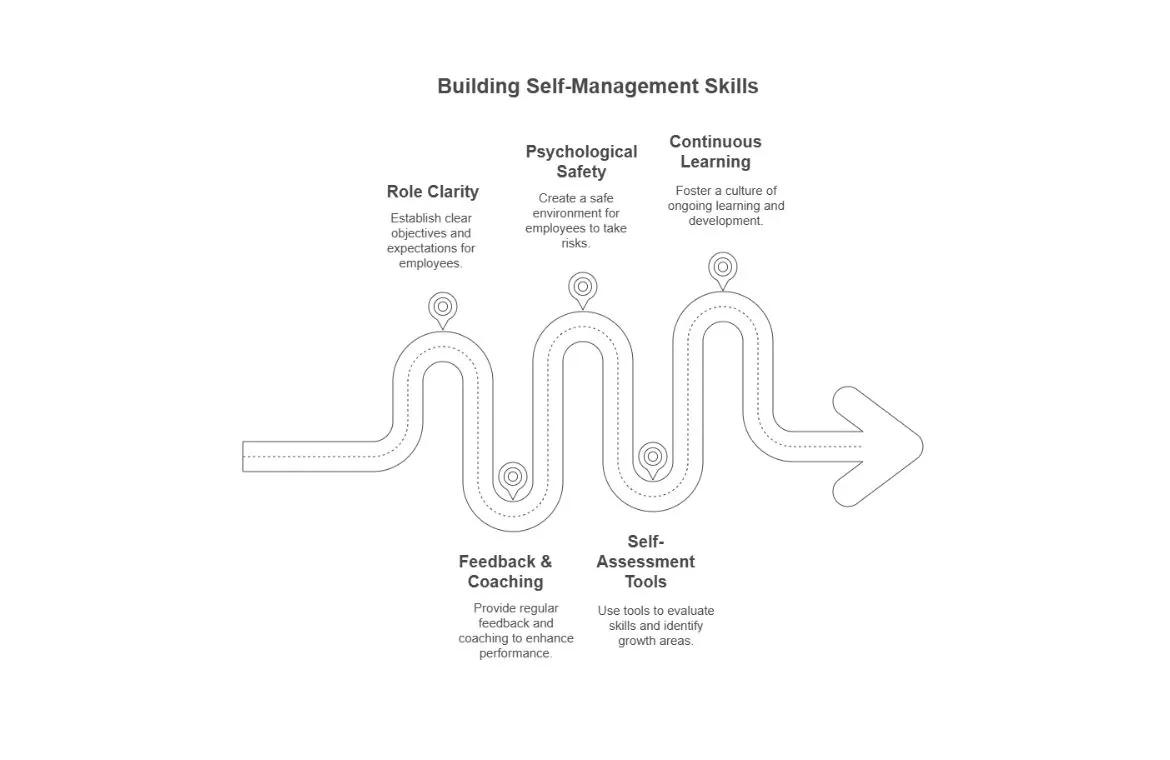Self-Management Strategies and Skills

In a world where distractions are constant and expectations keep rising, mastering self-management has become not just a personal goal but a professional necessity. Your ability to manage time, emotions, and responsibilities can define your success.
Self-management skills have become an essential part of workplace success in today's evolving business world.
“Discipline is choosing between what you want now and what you want most.” — Abraham Lincoln.
What is meant by Self-Management?
Self-management is the ability to control your thoughts, emotions, and actions to stay focused, organized, and productive. It involves setting goals, managing time, handling stress, and staying motivated.
Self-management serves as a key foundation to professional success that goes beyond basic time management or organizational skills. A really good grasp of this concept can change how well you work and advance in your career.
Self-management boils down to making conscious choices. People choose effective behaviors over unproductive habits. The concept has gained much attention from HR professionals as workplace norms keep changing, especially for teams managing remote and hybrid workers.
Why is Self-Management so important in an Organization?

Self-management has become a vital organizational capability, not just an individual skill, in today's ever-changing business scene. Companies now realize that employees who manage themselves well add a lot to business success, productivity, and workplace culture.
Supports autonomy and accountability
Self-management reshapes how authority works in organizations. Traditional hierarchical structures keep decision-making centralized. But self-management gives authority to team members. This distribution creates ownership and responsibility that boosts employee participation.
Self-management directly leads to more accountability. Employees who take charge of their thoughts, actions, and behaviors become more dedicated to their work. They show higher morale and deliver outstanding results. This accountability creates trust and strengthens everyone's dedication to shared business goals.
Enables remote and hybrid work success
Remote workers need better self-discipline, motivation, and management skills to succeed. Without these skills, productivity drops, more employees quit, and hiring costs go up. Remote work needs people to rank tasks, make choices, and meet deadlines without direct supervision. Managing time becomes vital in remote settings. Workers must stay focused despite home distractions.
This often needs constant stress control and emotional balance. Time management and priority-setting strategies improve work participation. Organizations that encourage self-management do better in remote and hybrid settings. They set clear team goals but let people share their ideas and solutions. This keeps the team's independence and ownership strong.
Drives innovation and decision-making
Self-management remarkably shapes innovation in organizations. Self-leadership affects innovative behavior. Better employee self-leadership leads to more innovative behavior. The most important strategies are thought pattern strategies, teams staying positive, and affecting innovative work behaviors.
Self-managed structures speed up decision-making because decisions happen where needed. Employees get more freedom to decide and choose methods than in traditional structures. So self-leadership motivates employees to add more value to organizational performance. They become more capable, forward-thinking, responsible, resilient, and confident in their work.
Self-management builds the foundation for a more productive, satisfied, innovative, and collaborative workforce. These elements help organizations succeed in today's competitive business world.
What are Self-Management Skills?

"Efficiency is doing the thing right. Effectiveness is doing the right thing."
Professional effectiveness in today's workplace depends on mastering specific self-management skills. These core competencies create a foundation for success, whatever your industry or position.
Time management
Time management helps you control your schedule by prioritizing critical tasks and creating effective routines. This skill keeps you focused and helps avoid procrastination. Professionals who excel at time management generate and apply a well-laid-out plan. They set time limits for tasks, establish daily work routines, and use tools to track progress.
Emotional regulation
Emotional regulation means knowing how to control and manage your emotional state, especially when facing challenges. You need to recognize emotional triggers and apply effective coping strategies. Successful strategies include creating space between trigger and response, naming emotions, accepting feelings as valid, and practicing mindfulness.
Self-awareness
Self-awareness builds the foundation of self-management. It lets you understand your strengths, weaknesses, and triggers. Regular self-reflection through journaling or dedicated contemplation helps you grasp emotional responses and behavioural patterns better. This awareness lets you consciously access your thoughts, desires, and feelings, a key step to controlling and expressing them appropriately.
Goal setting
Clear, measurable objectives form the foundations of effective self-management. The SMART framework (Specific, Measurable, Attainable, Relevant, Time-bound) boosts focus and motivation a lot. Strategic planning breaks down larger goals into manageable steps. This approach helps you track progress consistently and stay motivated during challenging periods.
Adaptability
Adaptability means learning new skills and behaviors as work environments change. Flexible professionals handle shifting priorities and respond better to unexpected challenges. Studies show that adaptability optimizes productivity and demonstrates resourcefulness. Leaders value this skill highly, as adaptable employees perform well even when plans change.
Accountability
Accountability means owning your thoughts, actions, and behaviour. Employees with this skill show more commitment to their work, display higher morale, and deliver exceptional results. Through accountability, you learn to take pride in your work, even during stressful situations or failures.
Real-world Examples of Self-Management
Real-life applications show how self-management skills turn theory into workplace success. These capabilities work differently across various professional settings, so let's take a closer look at some specific scenarios.
Example 1: Managing deadlines under pressure
Self-management becomes vital when you face tight deadlines and competing priorities. An HR executive found creative ways to handle many CVs each day. This professional kept efficiency and quality high by creating a simple reward system, reviewing 30 CVs before a 10-minute coffee break. The strategy ensured applicants got a response within five days.
Example 2: Leading without formal authority
Leadership without formal authority shows another significant way to use self-management skills. Picture yourself leading a project unofficially; you need to handle budgets, schedules, and team coordination without direct authority over team members.
Successful professionals use different sources of influence in these situations. They might show their domain expertise, know organisational processes really well, or demonstrate how their project fits strategic initiatives. A leadership expert puts it well: "If you want to be seen as a leader, don't wait until you get promoted, act like one now."
The strategies to inculcate these skills in the workplace

Organizations take the lead in building self-management capabilities by creating structured approaches and supportive environments. Self-management remains an individual journey, yet strategic support from organizations substantially increases its impact on teams.
Encourage role clarity and goal alignment.
Clear objectives and expectations are the foundations of effective self-management. An expert states, "If I don't know what results I'm supposed to deliver on, how can I possibly deliver them?" Successful organizations prioritize enablement over control and help employees understand their responsibilities while retaining autonomy. They develop clear job descriptions, conduct team alignment meetings, and ensure employees see how their roles connect to broader organizational goals.
Provide regular feedback and coaching.
Coaching revolutionizes self-management capabilities through two distinct approaches. "Coaching in the moment" involves daily interactions that target immediate performance improvement, while "coaching over time" builds relationships that promote reflection and development. The biggest difference between effective and ineffective feedback lies in its purpose. Teams become more receptive when feedback serves as a low-stakes learning chance rather than a final judgement.
Promote psychological safety
Psychological safety lets employees take interpersonal risks without fearing negative consequences. Research reveals 89% of employees think psychological safety matters in the workplace. Leaders can create this environment when they show curiosity, value truth-telling, treat mistakes as growth chances, and welcome constructive debate.
Use self-assessment tools
Self-assessment tools offer frameworks to evaluate skills, abilities, and areas for growth. Teams can use personality assessments like Myers-Briggs and StrengthsFinder to discover natural talents, emotional intelligence assessments, and skills-focused evaluations. These tools boost self-awareness about talents, gaps, and working styles that lead to more informed professional development.
Promote a culture of continuous learning.
A continuous learning environment keeps self-management development alive. Leaders can run informal exploratory activities, employees can lead lunch-and-learns, and consistent acknowledgment systems recognize learning achievements. Organizations that build this culture see substantial gains in worker productivity and organizational growth.
Wrapping Up: The Future of Workplace Success
Self-management skills are the lifeblood capability modern professionals need in today's digital world. In this article, we've explored how these core competencies, from emotional regulation and time management to adaptability and accountability, are the foundations for professional success, whatever your industry or position.
Strong self-management capabilities boost both your current performance and long-term career path. Tomorrow's workplace stars will be professionals who can control emotions, handle tasks well, adjust to changes, and stay accountable without supervision.
In the evolving landscape of the modern workplace, self-management is no longer optional. It’s foundational to long-term success. As organizations become more dynamic and roles more autonomous, professionals who can manage their time, mindset, and goals effectively will lead the way. Investing in business management courses can sharpen these self-management strategies by offering deeper insight into today’s complex managerial challenges. These programs don’t just teach theory, and they provide advanced, practical training that helps individuals build
With real-world case studies, peer interactions, and industry-relevant modules, learners gain the edge needed to thrive in self-directed roles and lead with purpose in a competitive, fast-paced environment. So the real question isn't whether to develop self-management skills, but how fast you can put strategies in place to boost them.
Frequently Asked Questions
1. How can you develop self-management skills?
You can develop self-management skills by setting clear goals, managing your time effectively, practicing self-discipline, seeking feedback, reflecting regularly, and using tools to track habits and progress consistently.
2. What is the key to learning and using self-management skills?
The key lies in self-awareness, understanding your strengths, triggers, and priorities, combined with consistent practice, time management, goal setting, and the willingness to adapt and improve through reflection and feedback.
3. What are the three major outcomes of self-management?
The three major outcomes are improved productivity, better emotional control, and enhanced personal accountability, helping individuals achieve goals, adapt to challenges, and contribute more effectively in personal and professional settings.

TalentSprint
TalentSprint is a leading deep-tech education company. It partners with esteemed academic institutions and global corporations to offer advanced learning programs in deep-tech, management, and emerging technologies. Known for its high-impact programs co-created with think tanks and experts, TalentSprint blends academic expertise with practical industry experience.



